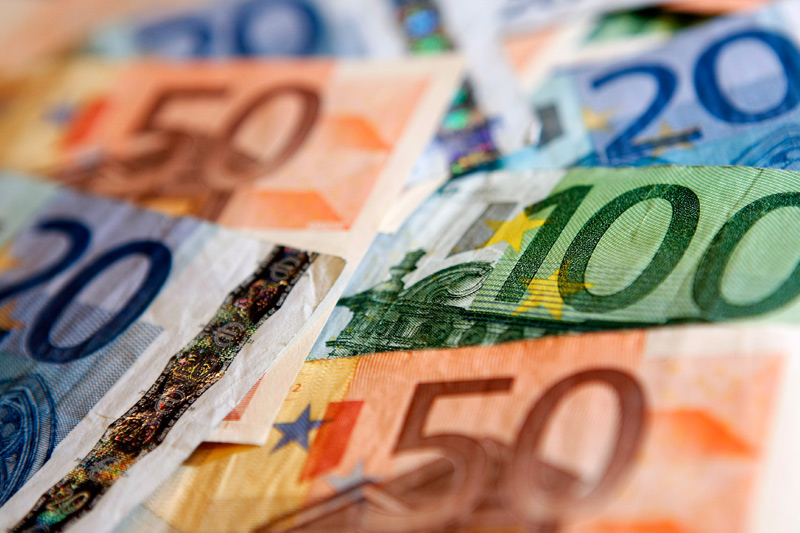Investing.com - The euro was lower against most of its major counterparts on Monday, as weak economic data and political uncertainty in the euro zone weighed on demand for higher yielding assets.
During European late morning trade, the euro was down the U.S. dollar, with EUR/USD shedding 0.51% to hit 1.3149.
Sentiment on the shared currency was hit after data showed that the euro zone's manufacturing output slumped to its lowest level since June 2009 this month, while its services sector fell to a five month low.
The preliminary euro zone manufacturing purchasing managers’ index fell to a seasonally adjusted 46.0 in April from a final reading of 47.7 in March. Analysts had expected the index to ease up by 0.5 points to 48.2 in April.
The preliminary euro zone services PMI slid to 47.9 from 49.2 in March. Analysts had expected the index to ease up by 0.2 points to 49.4.
The decline was driven by poor performances in Germany and France, with manufacturing activity in Germany slowing to the lowest level in almost three years.
The weak data fuelled fears economic growth in the region will be hit by planned government austerity measures.
Sentiment was further hit by fresh concerns over political uncertainty in the euro zone, as investors mulled the implications of the first round of the French presidential election and the failure of Dutch budget talks, which threatened to bring about the collapse of the government.
The single currency was hovering close to a 20-month low against sterling, with EUR/GBP sliding 0.35% to hit 0.8168.
The pound remained supported after data on Friday showed that U.K. retail sales posted the biggest jump in over a year in March, fuelling hopes that the economic recovery is gaining momentum and dampening expectations for a fresh round of monetary stimulus from the Bank of England.
The euro was sharply lower against the safe haven yen, with EUR/JPY tumbling 1.10% to hit 106.58, but remained little changed against the Swiss franc, with EUR/CHF dipping 0.01% to hit 1.2016.
The shared currency was mixed against the Canadian, Australian and New Zealand dollars, with EUR/CAD slipping 0.12% to hit 1.3098, EUR/AUD rising 0.27% to hit 1.2667 and EUR/NZD up 0.34% to hit 1.6200.
In Australia, official data showed that producer price inflation fell unexpectedly in the first quarter, fuelling expectations for a rate cut by the Reserve Bank of Australia at its policy meeting next week.
Also Monday, the Bank of Spain said it believes that the country’s economy has entered a recession.
The central bank said gross domestic product contracted by 0.4% in the three months to March. That follows a 0.3% contraction in the fourth quarter, and zero growth in the third quarter of last year.
During European late morning trade, the euro was down the U.S. dollar, with EUR/USD shedding 0.51% to hit 1.3149.
Sentiment on the shared currency was hit after data showed that the euro zone's manufacturing output slumped to its lowest level since June 2009 this month, while its services sector fell to a five month low.
The preliminary euro zone manufacturing purchasing managers’ index fell to a seasonally adjusted 46.0 in April from a final reading of 47.7 in March. Analysts had expected the index to ease up by 0.5 points to 48.2 in April.
The preliminary euro zone services PMI slid to 47.9 from 49.2 in March. Analysts had expected the index to ease up by 0.2 points to 49.4.
The decline was driven by poor performances in Germany and France, with manufacturing activity in Germany slowing to the lowest level in almost three years.
The weak data fuelled fears economic growth in the region will be hit by planned government austerity measures.
Sentiment was further hit by fresh concerns over political uncertainty in the euro zone, as investors mulled the implications of the first round of the French presidential election and the failure of Dutch budget talks, which threatened to bring about the collapse of the government.
The single currency was hovering close to a 20-month low against sterling, with EUR/GBP sliding 0.35% to hit 0.8168.
The pound remained supported after data on Friday showed that U.K. retail sales posted the biggest jump in over a year in March, fuelling hopes that the economic recovery is gaining momentum and dampening expectations for a fresh round of monetary stimulus from the Bank of England.
The euro was sharply lower against the safe haven yen, with EUR/JPY tumbling 1.10% to hit 106.58, but remained little changed against the Swiss franc, with EUR/CHF dipping 0.01% to hit 1.2016.
The shared currency was mixed against the Canadian, Australian and New Zealand dollars, with EUR/CAD slipping 0.12% to hit 1.3098, EUR/AUD rising 0.27% to hit 1.2667 and EUR/NZD up 0.34% to hit 1.6200.
In Australia, official data showed that producer price inflation fell unexpectedly in the first quarter, fuelling expectations for a rate cut by the Reserve Bank of Australia at its policy meeting next week.
Also Monday, the Bank of Spain said it believes that the country’s economy has entered a recession.
The central bank said gross domestic product contracted by 0.4% in the three months to March. That follows a 0.3% contraction in the fourth quarter, and zero growth in the third quarter of last year.
